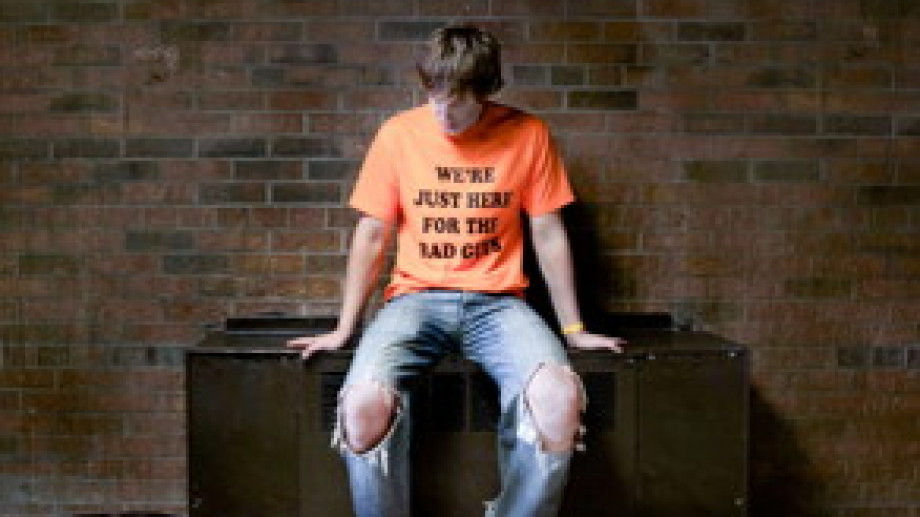
Matt Johnson's Locarno Film Festival feature The Dirties.
Adriana Floridia is a member of the second annual Critics Academy at the Locarno Film Festival. She takes up the topic of school violence and its portrayal on the big screen as depicted by actor/director Matt Johnson. You can follow her on Twitter at @adrifloridia.
Bullying and school violence have been relevant topics on and off the big screen, but given headline-grabbing tragedies in the past year at places like Sandy Hook elementary, addressing school shootings has taken on greater urgency. Films have described campus violence and its aftermath, but rarely have they waded into the psyche of the shooter. Locarno Film Festival feature, The Dirties, does just that, taking on the untidy complexities that can lead to tragedy.
The first feature-length project by Canadian director, writer and actor Matt Johnson has packed some very touchy content revolving around two students who are bullied and the grim result. Students Matt and Owen (played by Johnson and Owen Williams) are not among the popular set at their high school and are frequently picked on. As part of a project for their film class, the two make a movie portraying themselves as the heroes of the school, taking down a group of bullies known as “The Dirties.” Matt, however, increasingly becomes obsessed with taking their film project to the next level, instead wanting to make a movie about actually killing the bullies. The Dirties thus heavily blurs the lines between reality and fiction. Soon it becomes apparent though, that Matt has lost his sense of what is real and what is intended for the screen.

Bullying and school violence have been prevalent film backdrops lately. Two recent films touching on school shootings in particular came out in 2011: We Need to Talk About Kevin and Beautiful Boy. These films, however, did not get the viewer inside the the heads of these youth who turn to violence instead focusing on the shooters' parents and how their kids' decisions affected their lives. Audiences were left wondering what drove these kids to go off the deep end. The Dirties works almost as a hybrid of these two ideas, demonstrating the cumulative effect of bullying on Matt and Owen, while describing the path that compels them to seek revenge.
Kids who turn to violence are often dismissed as evil or insane. In We Need to Talk About Kevin, for example, actor Ezra Miller plays the title role of Kevin, a child who is believed to have had an evil stroke ever since he was born, devoid of humanity. He is seen as a monster from the get-go, and the mass murder that he commits at school is considered by victims, peers and parents as ghoulish fun. Beautiful Boy, meanwhile, gives brief insight into the shooter's mindset through video footage. His reasoning and personal turmoil are left unexplained, leaving the viewer still wondering how he could commit such horrific acts.
The Dirties, however, takes the viewer right into the mind of the shooters, as we only get the perspective of Matt and Owen throughout the film. The Dirties still keeps the viewer guessing throughout, as it never seems conceivable that Matt or Owen would ever actually hurt anybody and that sets this film apart from others that have dealt with school violence. It dares the audience to go along for the ride with the victims until they are no longer the ones being victimized.

There is absolutely no arguing that the perpetrator of a school shooting may be a severely insane or inhumane since the media usually portrays them as such. The Dirties, however, turns that notion on its head, suggesting that it is okay to commit such a crime as long as you are “only killing the bad guys.” The Dirties, therefore, breaks new ground by attempting to describe how even the most innocent, naïve people can be driven to madness because of bullying.
It is, of course, concerning that a film may possibly glorify school shootings or lessen their terrible impact. The Dirties in fact ends without showing the full consequences the shooters must face for their actions, but it may be argued that that is not its job. Films like We Need to Talk About Kevin and Beautiful Boy are primarily focus on the dire consequences faced by both the shooter and their families and the shooter is rendered impossible to sympathize with. We Need to Talk About Kevin especially emphasizes the personal turmoil faced by Kevin's mother, Eva (Tilda Swinton). People tacitly consider her a monster for in fact raising such a child. Likewise in Beautiful Boy, the focus is also on the shooter's parents who are haunted by having raised a child who goes to such dizzying lengths for revenge.
The Dirties simply stays with the shooters' point of view. They are front and center for the entire film and the narrative virtually forces the audience to be on their side. They may be bullied, victimized, and therefore driven to the extreme, but in the end they are still two real, fully developed characters not much different than anyone else. They are void of the monster qualities depicted in other films and that poses an important contradiction to what society is so used to. The Dirties poses a moral challenge blurring the lines between victim and perpetrator. It is daring in challenging societal judgments, but ultimately leaves it to the viewer to decide, if Matt and Owen are deserving of sympathy.



